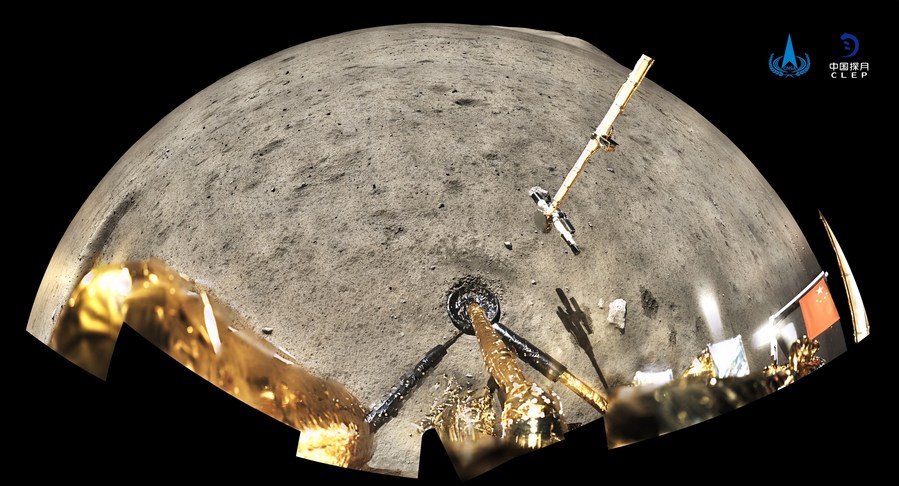
The opening ceremony of "Space Day of China" in Nanjing, east China's Jiangsu Province, April 24, 2021. /Xinhua
The opening ceremony of "Space Day of China" in Nanjing, east China's Jiangsu Province, April 24, 2021. /Xinhua
Editor's note: Wang Li is a professor at Jilin University. The article reflects the author's opinions and not necessarily the views of CGTN.
On April 24, which was Space Day in China, a formal statement announced that China and Russia have agreed to join forces in building a research station on or orbiting the Moon. The significance of cooperation in lunar exploration is sure to go beyond the services of the two countries, as they invite other international partners to participate in a lunar scientific research in accordance with the tenets of "mutual consultation, joint construction and shared benefits."
China and Russia have individually launched several Moon missions over the past years. Now both are firm believers of robotic missions to Mars that would be joined by other countries of the international community to further explore the space. For sure, given the remaining tough situation encroached by the global pandemic, any multilateral cooperation on lunar scientific research would likely bring courage and hope for the international community.
On April 18, Russia declared that it would withdraw from the current international space station by 2025 and create a Russian-owned space station. Yet, on March 9, China and Russia had signed a memorandum of understanding on joint constructing an international space station.
The reports on the Sino-Russian lunar collaboration had been speculated. Just last month, political scientist Graham Allison discussed the dimensions of cooperation between the two Eurasian powers as they planned to construct an International Lunar Research Station (ILRS) on the Moon or in lunar orbit to carry out multi-disciplinary and multi-objective scientific research activities. Echoing what some eminent experts and specialists in space issues have argued, Allison opined that this collaboration would be sure to cause substantial impact on the United States' relations with China and Russia and on international security as well.

China's national flag unfurled from the Chang'e-5 probe on the moon, December 4, 2020. /China National Space Administration
China's national flag unfurled from the Chang'e-5 probe on the moon, December 4, 2020. /China National Space Administration
Firstly, the expansion of the Sino-Russian cooperation into a lunar station further is a testament to the final formation of what former U.S. National Security Advisor and political scientist Zbigniew Brzezinski aptly called the "alliance of the aggrieved." Thanks to the awkwardness of the U.S. statesmanship in dealing with China and Russia, the strategic partnership of the two Eurasian powers has been operationally more consequential than the much more frequently touted strategic solidarity between the U.S. and India.
Secondly, since the disintegration of the former Soviet Union, China and Russia have realized the necessity of moving towards a strong consensus that aims to change the U.S.-led unipolar world order. To that end, , each country has earnestly collaborated to establish a multipolar order that dethrones the U.S. as the global hegemony. Accordingly, a lunar base operated by Chinese-Russian condominium is seen as a "long-term security challenge" by the United States and its allies.
But neither China nor Russia appears to exclude any possible collaboration with the international community. In fact, China National Space Administration (CNSA) has invited scientists from around the world to participate in the ILRS program. As the CNSA reiterated, the mission aims to serve the survival, security and sustainability of the global village by studying the formulation and evolution of the solar system.
Thirdly, China and Russia have welcomed healthy competition internationally but opposed to any sorts of arms race in the space. There is a looming prospect, at least in theory, that China and Russia will co-construct a lunar station before the United States does. If that occurs, this joint Sputnik in the 21st century would dent America's reputation as the world's leading technological giant. It also gives China and Russia an advantage in what some see as an inevitable race for the Moon's resources, and back on Earth, their space station would further solidify what it is described as "a comprehensive strategic partnership of coordination." Since the U.S. views both Russia and China as competitors, the further strengthening of Sino-Russian partnership will not be in America's interest.
(If you want to contribute and have specific expertise, please contact us at opinions@cgtn.com.)

